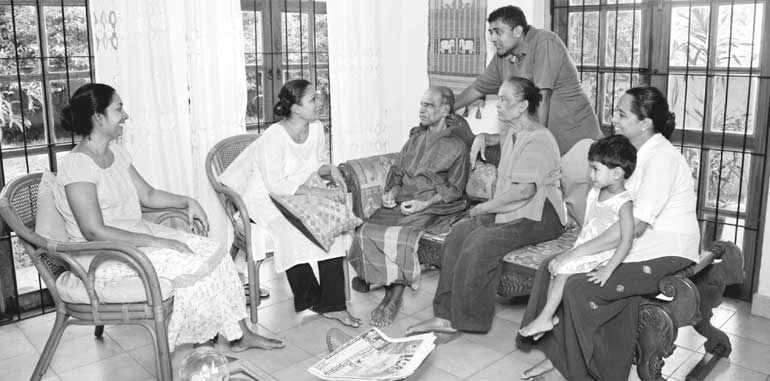Friday Feb 13, 2026
Friday Feb 13, 2026
Saturday, 12 November 2016 01:29 - - {{hitsCtrl.values.hits}}
Religious rights are performed. Funeral orations are delivered. The musical legend’s body is about to be taken to the pyre. The musicians present – quite a number – gather. They solemnly sing the Maestro’s favourite song ‘Sasara vasana turu nivan dakina turu…’ wishing that he be fortunate to be born again in this golden earth.
Many including our leading singer Nanda Malini are weeping. Obviously her thoughts went back to her Lama  Mandapaya days at Radio Ceylon when he picked her to sing in ‘Ranmuthu duwa’ (she sang the award-winning song ‘Galana gangaki jeevithe’ with Narada Disasekera) and quietly started on her musical career under his guidance. She has always acknowledged it.
Mandapaya days at Radio Ceylon when he picked her to sing in ‘Ranmuthu duwa’ (she sang the award-winning song ‘Galana gangaki jeevithe’ with Narada Disasekera) and quietly started on her musical career under his guidance. She has always acknowledged it.
Within 24 hours popular musician Rookantha sings a tribute song. It’s a composition by seasoned TV personality Kelum Srimal – a creative effort using lines from songs sung by the maestro.
New generation singer Umarea who has had the fortune of singing with Pandit Amaradeva not so long ago pays tribute all the way from France. “The best way to show my gratitude is to sing the only song I sang with him,” she says. Accompanied by Dimitri Fonseka on the piano, she sings ‘Balaa velapemi nelaaganu beri hantana sihine’ – the lilting theme song of ‘The Garden University’, the documentary film on Peradeniya University.
Soon after, she adds another message in her Facebook: “I love Master’s songs with all my heart and even though this is such a great loss, he will live in our hearts for ever,” and sings ‘Ipidia mere yali ipida – Sasara sayura sagare’, another Amaradeva song on the life cycle.
The week in mourning is on. I pick a tribute song by Sunil Edirisinghe on YouTube. Two days later lyric writer Sunil Sararth Perera pays tribute with a new composition sung by Jagath Wickremasinghe. I am reminded of a chit chat on a TV channel a few months back with Pandit Amaradeva where Jagath played the keyboard and supported him in singing. Professor K.N.P.O. Dharmadasa joined the conversation.
 Recent photograph of Pandit Amaradeva with the family captured by Sarath Perera
Recent photograph of Pandit Amaradeva with the family captured by Sarath Perera
The TV channels had enough material to bring back nostalgic memories of Pandit Amaraeva’s heyday. I saw several well-produced programmes of yesteryear over Rupavahini. One of the most impressive was one presented by H.M. Gunasekera, the veteran radio/TV personality who departed a few years back. Amaradeva was at his best. He sang devotional songs that evening being a Poson Poya day. His selection of songs ranged from Sri Chandraratne Manawasinghe’s ‘Maha Bo Vannama’ to Mahagama Sekara’s ‘Siripa Piyume’ – the theme song from the film ‘Ran Salu’. He explained the background to each song and sang all the songs without any notes.
He had an ideal presenter in H.M. who used simple, meaningful words and was always to the point. He never used fancy language.
As Prime Minister Ranil Wickremesinghe said in his funeral oration, thanks to internet we can continue to enjoy Amaradeva’s immortal songs. He confessed often after work around 11 p.m. he tunes in and listens.
President Maithripala Sirisena announced the creation of an ‘Amaradeva Arts Academy’.
Pandit Amaradeva received a farewell he well deserved – with State patronage. For the President to forget about protocol and act like a personal friend was something many would not have accepted.
The trio who worked hard to create an indigenous Sri Lankan music tradition – Ananda Samarakoon, Sunil Santha and W.D. Amaradeva – have departed. They have laid a solid foundation. It’s the responsibility of other senior and upcoming musicians to ensure its continuation and improvement.